 Technology peripherals
Technology peripherals
 AI
AI
 OpenAI board of directors regrets in seconds! Altman asked to return to CEO position
OpenAI board of directors regrets in seconds! Altman asked to return to CEO position
OpenAI board of directors regrets in seconds! Altman asked to return to CEO position
In one day, the OpenAI board of directors changed their face.
The latest news is that they intend toreturn Ultraman to the CEO position.

According to multiple sources, the OpenAI board of directors underwent major changes in just one day due to "investor anger"
According to reports, Microsoft CEO Nadella showed extreme anger after learning of Altman's resignation. He has been in touch with Altman and pledged his support
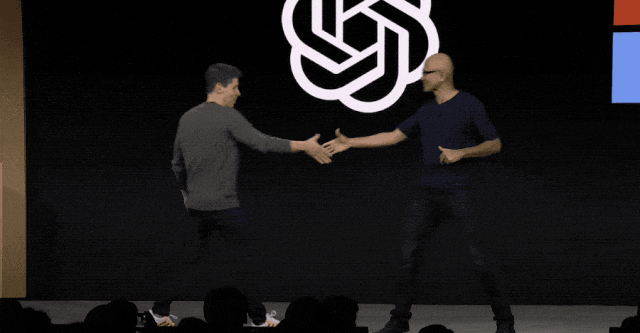
# while some major investors are considering filing a lawsuit against the board.
Before OpenAI fired Altman, the venture capital firm Khosla Ventures, LinkedIn, and OpenAI’s former board member Reid Hoffman did not receive advance notice
They even owned 49% of OpenAI Microsoft, which owns shares, only received the news 5-10 minutes before the announcement.
But it’s really uncertain whether Ultraman can return, because he himself is hesitant now.
According to the Wall Street Journal, Altman set out conditions for his return, including establishing a new board of directors.
According to reports, there is also news that Altman is considering another option, which is to start a new company composed of former OpenAI employees
OpenAI’s board of directors’ dismissal of Altman caused a huge internal crisis After the earthquake, President Brockman, many senior executives, and many OpenAI employees chose to resign after receiving the news.
Ultraman triggers a chain reaction
According to a report by The Verge, the current board of directors allegedly agreed in principle and allowed Ultraman and Brockman to return

The board’s hesitation resulted in missing 5 pm US time on Saturday, which is the deadline for many OpenAI employees to decide to leave. If Ultraman is determined to leave and start a new company, they will definitely follow him
When Ultraman was fired, OpenAI immediately launched a series of personnel changes
His friend Greg Greg Brockman, the president of OpenAI, was the first to announce his resignation (he was stripped of his position as chairman of the board of directors in this incident, but was not fired).
After Brockman, at least three senior researchers followed in his footsteps.
Including research director Jakub Pachocki, head of the team assessing AI risks Aleksander Madry and researcher Szymon Sidor, who joined OpenAI almost immediately after its founding.
And there is news that in addition to a few of them, more and more employees are requesting to resign.
Among them, Brockman's determination is evident. He was also shocked when he saw the news, "shocked and sad", and then quickly sent a short resignation notice to OpenAI, although the wording was very "decent" .
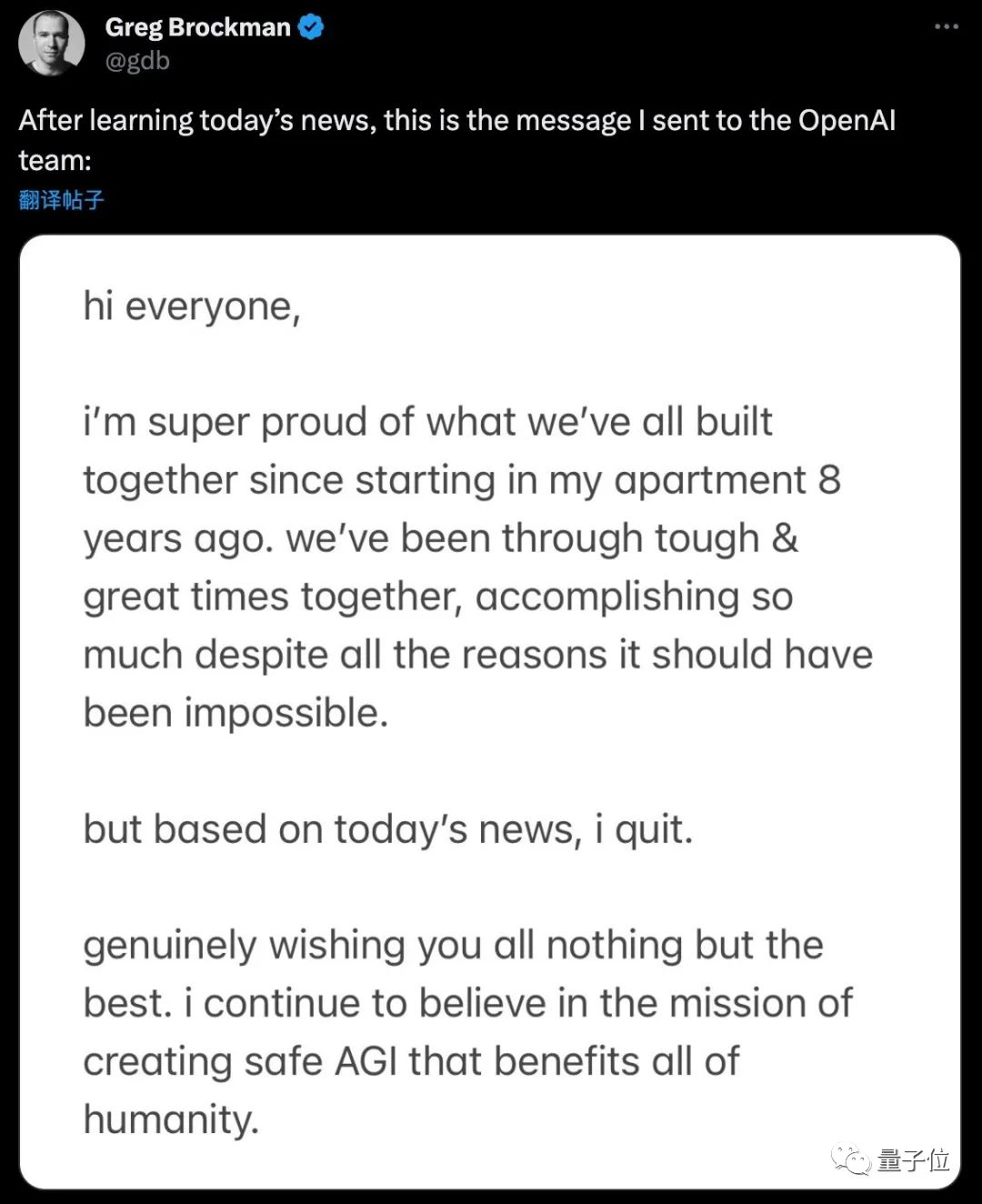
At the same time, news of Ultraman’s new company also spread widely
Bloomberg stated that Ultraman has been seeking to raise tens of billions of dollars from the Middle East ,Create an AI chip start-up to compete with NVIDIA.
In short, the board of directors renegotiated with Ultraman one day after making the decision, which shows that OpenAI will have a significant impact without Ultraman.
Who fired Ultraman?
In Silicon Valley, it’s not uncommon for founders to be fired from their own companies, but this incident apparently caused a huge stir
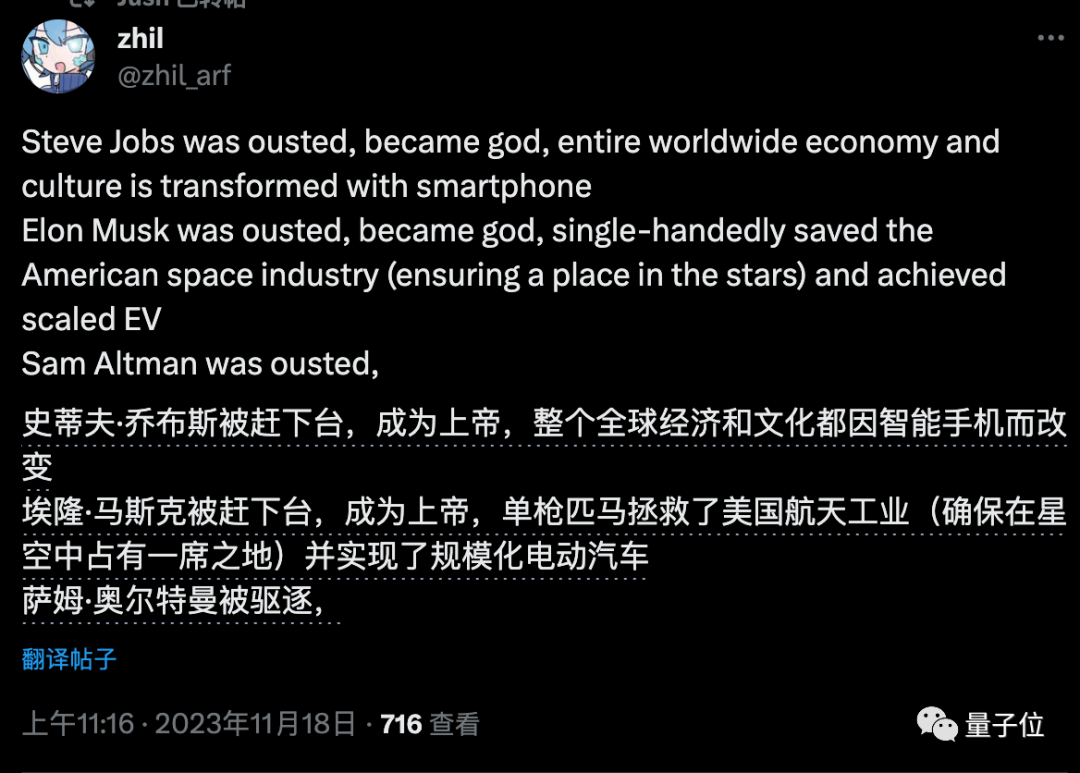
OpenAI’s board of directors It is really unique
The content that needs to be rewritten is: It is worth mentioning that this project was created by Ultraman himself
In 2019, Ultraman designed for OpenAI Developed a groundbreaking organizational structure:
transformed from a non-profit organization to a "profit capped" model.
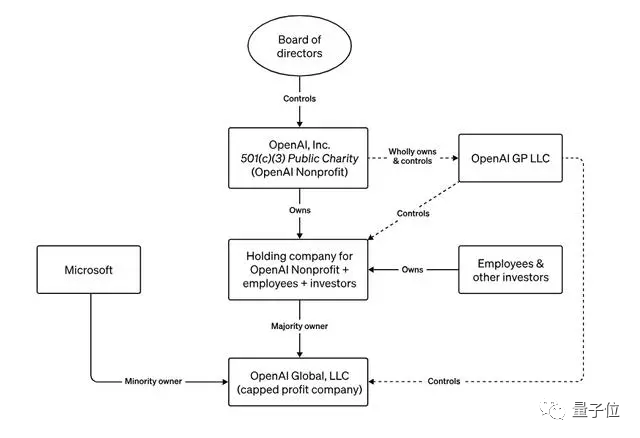
The way OpenAI is formed has changed and now consists of the OpenAI non-profit organization and the for-profit subsidiary OpenAI Global LLC
The latter is responsible for business Ambition, can accept investments and set a rate of return, but there is a limit or cap on the amount of profit that can be earned.
The company's goal is to ensure that it serves its customers and contributes to the greater good, rather than pursuing maximum profits
But most importantly, the latter must operate under the governance of the former.
The former, that is, the boards of directors of non-profit organizations responsible for overall matters are usually people from outside OpenAI and "have their own values."
For example, three of them are Adam D'Angelo, co-founder and CEO of Quora, Helen Toner, director of strategic and basic research funds at the Center for Security and Emerging Technologies (CSET) at Georgetown University, and a joint venture between Fellow Robots Founder Tasha McCauley
There are only six people on the entire board of directors, and they have absolute say.
After Altman and Brockman left,there was only Ilya on the board of directors People are OpenAI insiders.
But what is disappointing is that there are reports that Ilya is the "initiator" who kicked out Ultraman.
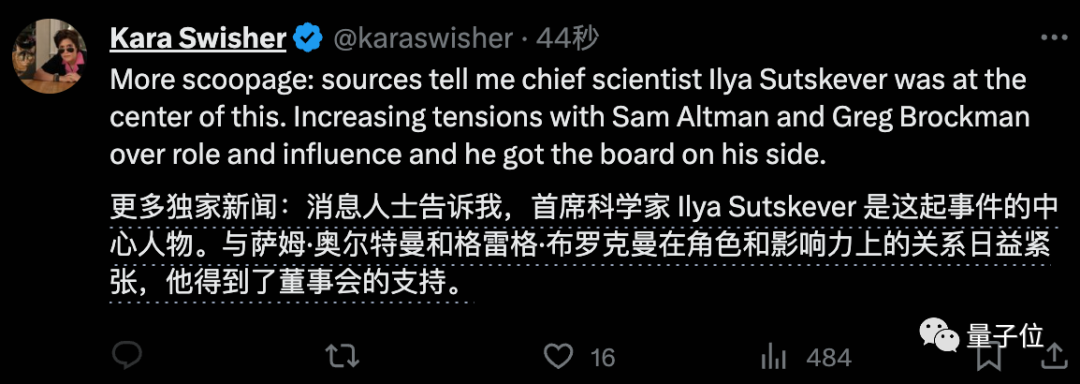
Ultraman and Brockman also shared some internal trends before the "earthquake" in a joint statement later, in which mentioned Ilya many times. Asked to talk about , and it was him who personally told Ultraman the news of being "fired". 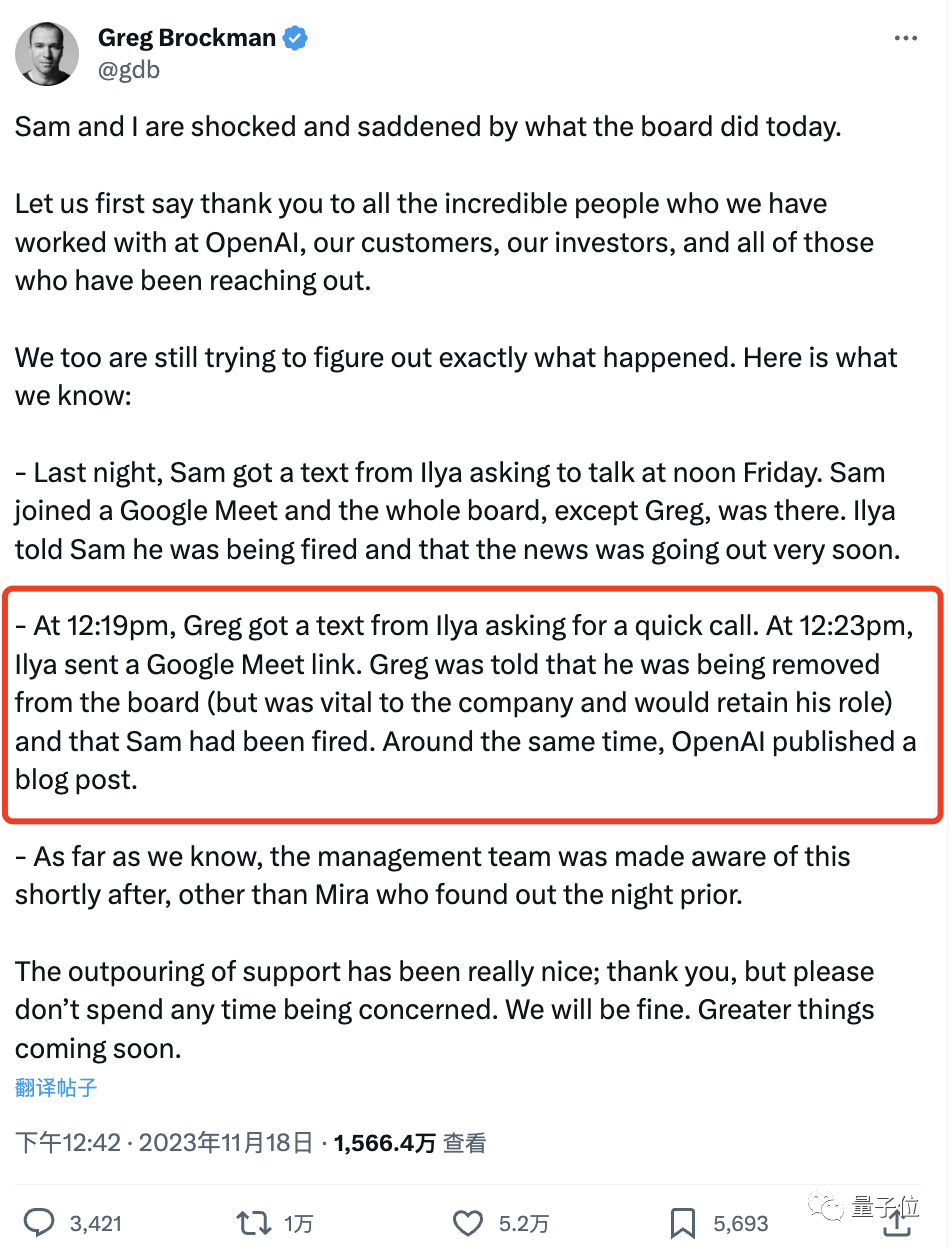
According to people familiar with the matter, before Ultraman was fired, there was an internal debate within the company about AI safety

Some people worry that Ultraman hastily pushed technology to the market without adequate safety review, and is increasingly focusing on fame and fortune.
However, regarding the reason for Altman's removal, the explanation previously proposed by the board of directors was:
Mr. Altman was never candid in his communication with the board of directors, hindering the ability of the board of directors to perform its duties. The board no longer has confidence in his ability to continue leading OpenAI.
But an internal document seen by Axios shows that this may not be the case. The real reason is "Communication Interruption".
It is not yet possible to know the specific details, and it will take some time.
However, in the past two days, there have been a lot of complaints from everyone, especially to the board of directors.
Some people ask, why does Microsoft own 50% of OpenAI's shares, but does not have a board seat?

Some people also question, if even the company’s board of directors cannot reach an agreement, how can artificial intelligence (AGI) be aligned?

and previous videos of Altman attending the hearing were also uncovered. At that time, Altman said that he did not have real power over OpenAI.
The congressman said: Then you have to find a lawyer.
The congressman is still experienced...
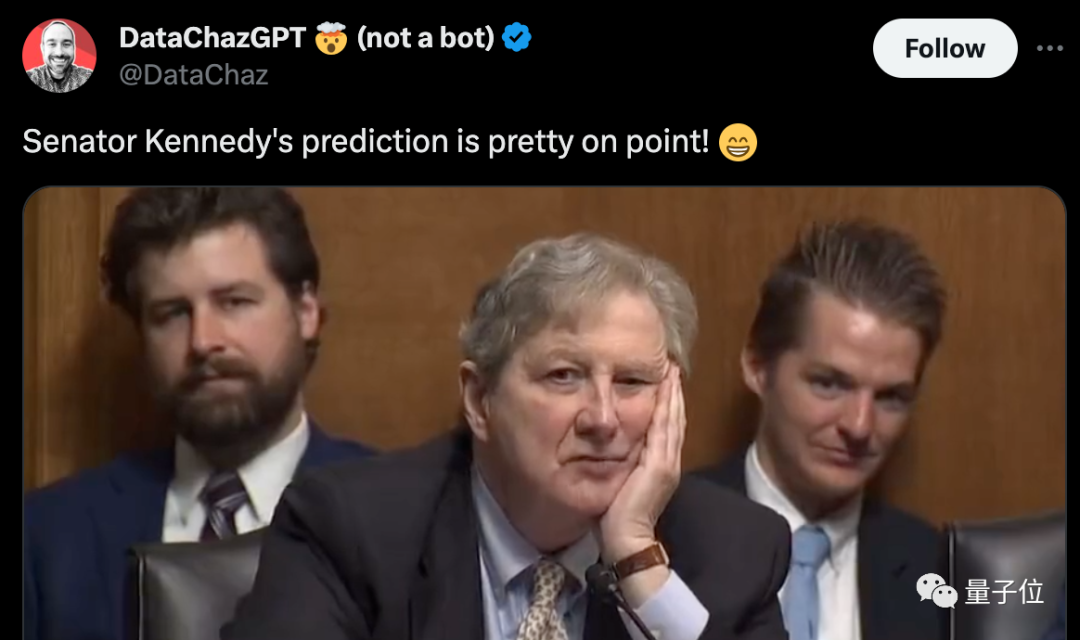
The above is the detailed content of OpenAI board of directors regrets in seconds! Altman asked to return to CEO position. For more information, please follow other related articles on the PHP Chinese website!

Hot AI Tools

Undresser.AI Undress
AI-powered app for creating realistic nude photos

AI Clothes Remover
Online AI tool for removing clothes from photos.

Undress AI Tool
Undress images for free

Clothoff.io
AI clothes remover

Video Face Swap
Swap faces in any video effortlessly with our completely free AI face swap tool!

Hot Article

Hot Tools

Notepad++7.3.1
Easy-to-use and free code editor

SublimeText3 Chinese version
Chinese version, very easy to use

Zend Studio 13.0.1
Powerful PHP integrated development environment

Dreamweaver CS6
Visual web development tools

SublimeText3 Mac version
God-level code editing software (SublimeText3)

Hot Topics
 1664
1664
 14
14
 1423
1423
 52
52
 1321
1321
 25
25
 1269
1269
 29
29
 1249
1249
 24
24
 How to use the chrono library in C?
Apr 28, 2025 pm 10:18 PM
How to use the chrono library in C?
Apr 28, 2025 pm 10:18 PM
Using the chrono library in C can allow you to control time and time intervals more accurately. Let's explore the charm of this library. C's chrono library is part of the standard library, which provides a modern way to deal with time and time intervals. For programmers who have suffered from time.h and ctime, chrono is undoubtedly a boon. It not only improves the readability and maintainability of the code, but also provides higher accuracy and flexibility. Let's start with the basics. The chrono library mainly includes the following key components: std::chrono::system_clock: represents the system clock, used to obtain the current time. std::chron
 How to understand DMA operations in C?
Apr 28, 2025 pm 10:09 PM
How to understand DMA operations in C?
Apr 28, 2025 pm 10:09 PM
DMA in C refers to DirectMemoryAccess, a direct memory access technology, allowing hardware devices to directly transmit data to memory without CPU intervention. 1) DMA operation is highly dependent on hardware devices and drivers, and the implementation method varies from system to system. 2) Direct access to memory may bring security risks, and the correctness and security of the code must be ensured. 3) DMA can improve performance, but improper use may lead to degradation of system performance. Through practice and learning, we can master the skills of using DMA and maximize its effectiveness in scenarios such as high-speed data transmission and real-time signal processing.
 How to handle high DPI display in C?
Apr 28, 2025 pm 09:57 PM
How to handle high DPI display in C?
Apr 28, 2025 pm 09:57 PM
Handling high DPI display in C can be achieved through the following steps: 1) Understand DPI and scaling, use the operating system API to obtain DPI information and adjust the graphics output; 2) Handle cross-platform compatibility, use cross-platform graphics libraries such as SDL or Qt; 3) Perform performance optimization, improve performance through cache, hardware acceleration, and dynamic adjustment of the details level; 4) Solve common problems, such as blurred text and interface elements are too small, and solve by correctly applying DPI scaling.
 What is real-time operating system programming in C?
Apr 28, 2025 pm 10:15 PM
What is real-time operating system programming in C?
Apr 28, 2025 pm 10:15 PM
C performs well in real-time operating system (RTOS) programming, providing efficient execution efficiency and precise time management. 1) C Meet the needs of RTOS through direct operation of hardware resources and efficient memory management. 2) Using object-oriented features, C can design a flexible task scheduling system. 3) C supports efficient interrupt processing, but dynamic memory allocation and exception processing must be avoided to ensure real-time. 4) Template programming and inline functions help in performance optimization. 5) In practical applications, C can be used to implement an efficient logging system.
 How to measure thread performance in C?
Apr 28, 2025 pm 10:21 PM
How to measure thread performance in C?
Apr 28, 2025 pm 10:21 PM
Measuring thread performance in C can use the timing tools, performance analysis tools, and custom timers in the standard library. 1. Use the library to measure execution time. 2. Use gprof for performance analysis. The steps include adding the -pg option during compilation, running the program to generate a gmon.out file, and generating a performance report. 3. Use Valgrind's Callgrind module to perform more detailed analysis. The steps include running the program to generate the callgrind.out file and viewing the results using kcachegrind. 4. Custom timers can flexibly measure the execution time of a specific code segment. These methods help to fully understand thread performance and optimize code.
 Quantitative Exchange Ranking 2025 Top 10 Recommendations for Digital Currency Quantitative Trading APPs
Apr 30, 2025 pm 07:24 PM
Quantitative Exchange Ranking 2025 Top 10 Recommendations for Digital Currency Quantitative Trading APPs
Apr 30, 2025 pm 07:24 PM
The built-in quantization tools on the exchange include: 1. Binance: Provides Binance Futures quantitative module, low handling fees, and supports AI-assisted transactions. 2. OKX (Ouyi): Supports multi-account management and intelligent order routing, and provides institutional-level risk control. The independent quantitative strategy platforms include: 3. 3Commas: drag-and-drop strategy generator, suitable for multi-platform hedging arbitrage. 4. Quadency: Professional-level algorithm strategy library, supporting customized risk thresholds. 5. Pionex: Built-in 16 preset strategy, low transaction fee. Vertical domain tools include: 6. Cryptohopper: cloud-based quantitative platform, supporting 150 technical indicators. 7. Bitsgap:
 Steps to add and delete fields to MySQL tables
Apr 29, 2025 pm 04:15 PM
Steps to add and delete fields to MySQL tables
Apr 29, 2025 pm 04:15 PM
In MySQL, add fields using ALTERTABLEtable_nameADDCOLUMNnew_columnVARCHAR(255)AFTERexisting_column, delete fields using ALTERTABLEtable_nameDROPCOLUMNcolumn_to_drop. When adding fields, you need to specify a location to optimize query performance and data structure; before deleting fields, you need to confirm that the operation is irreversible; modifying table structure using online DDL, backup data, test environment, and low-load time periods is performance optimization and best practice.
 How does deepseek official website achieve the effect of penetrating mouse scroll event?
Apr 30, 2025 pm 03:21 PM
How does deepseek official website achieve the effect of penetrating mouse scroll event?
Apr 30, 2025 pm 03:21 PM
How to achieve the effect of mouse scrolling event penetration? When we browse the web, we often encounter some special interaction designs. For example, on deepseek official website, �...



